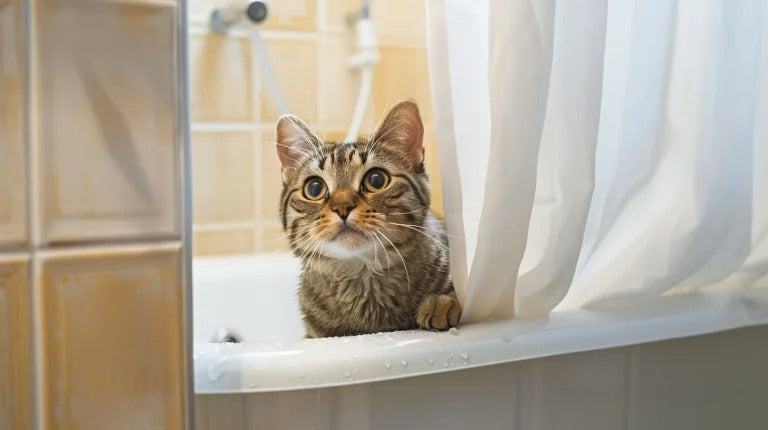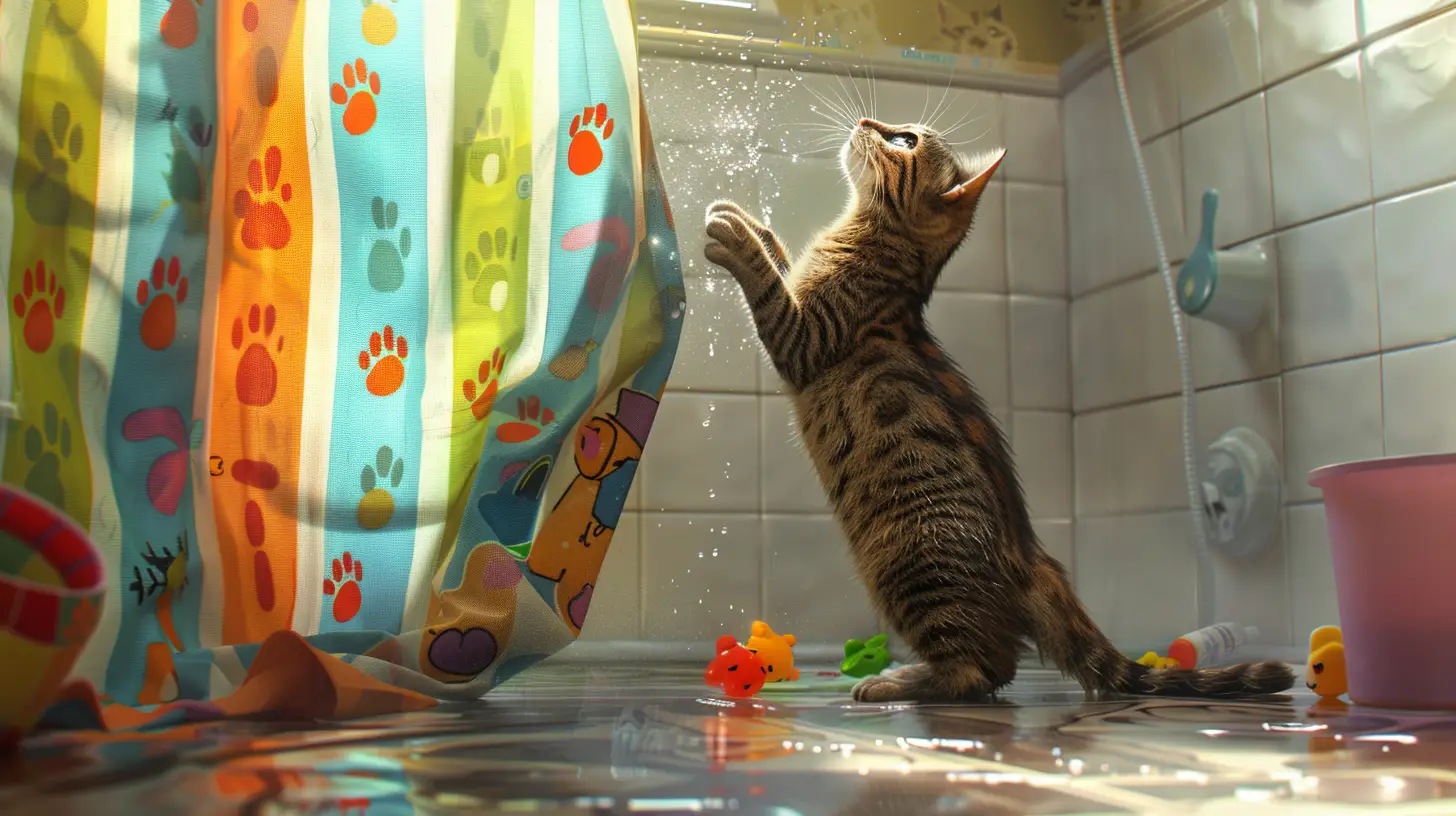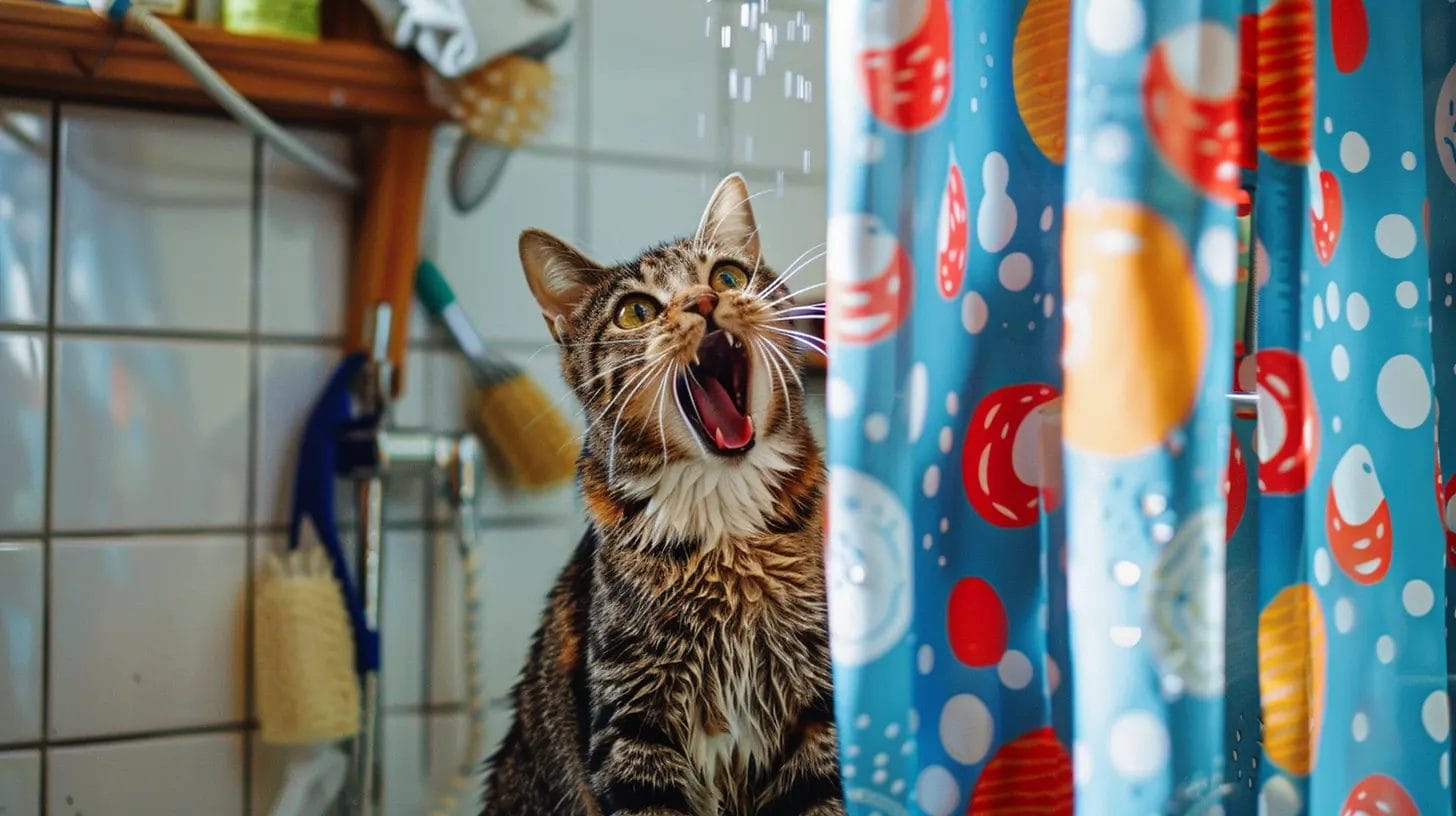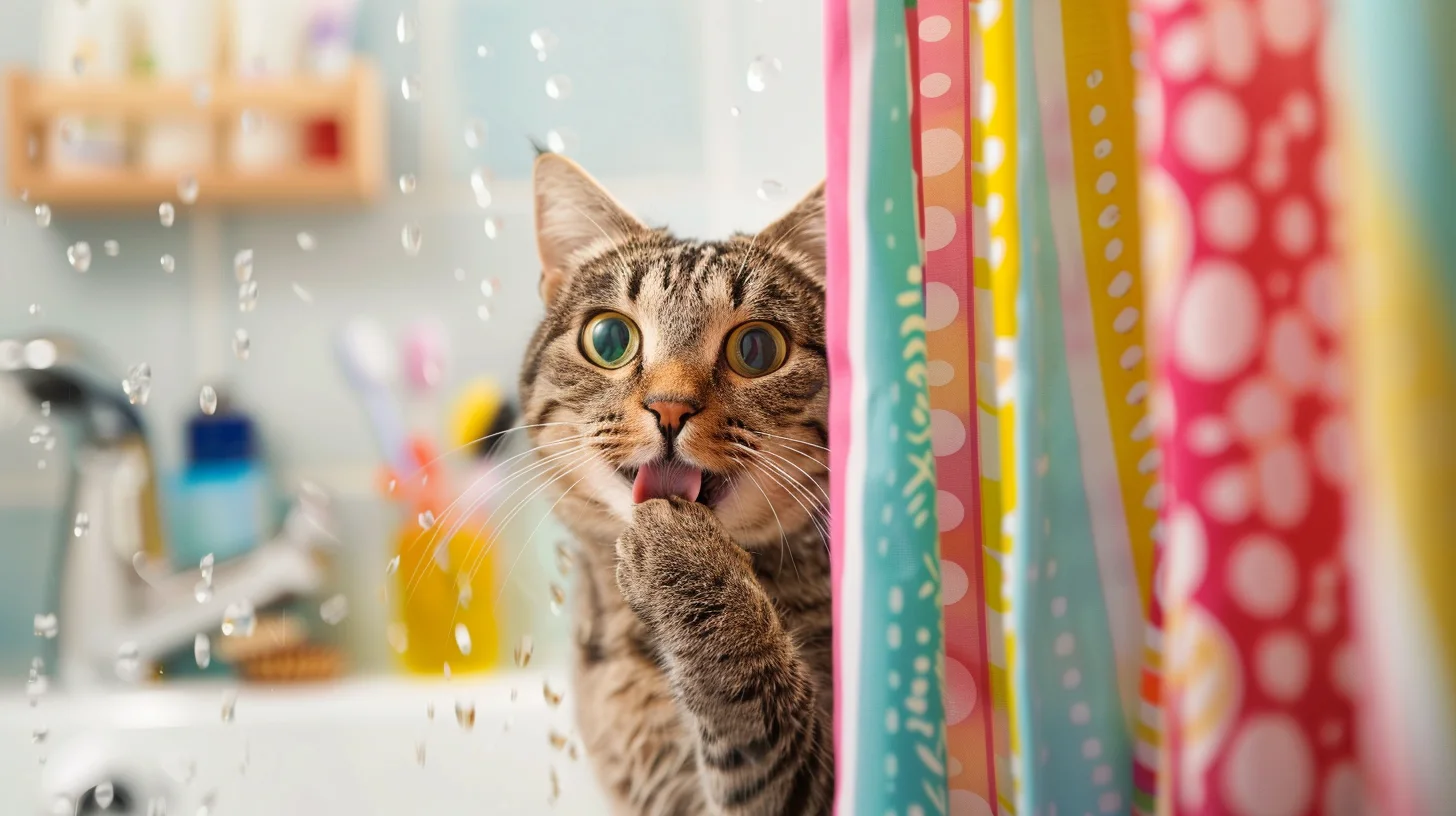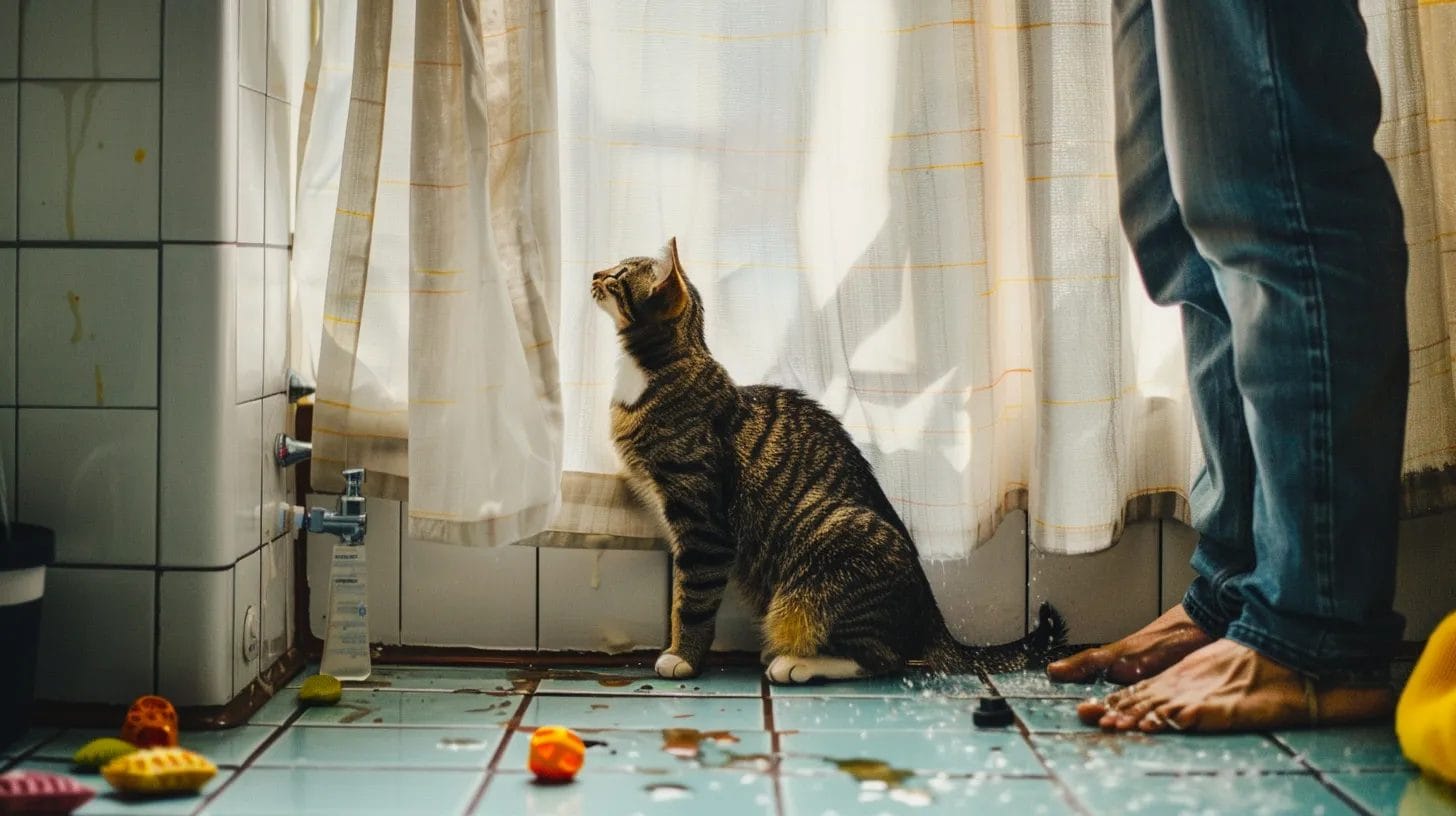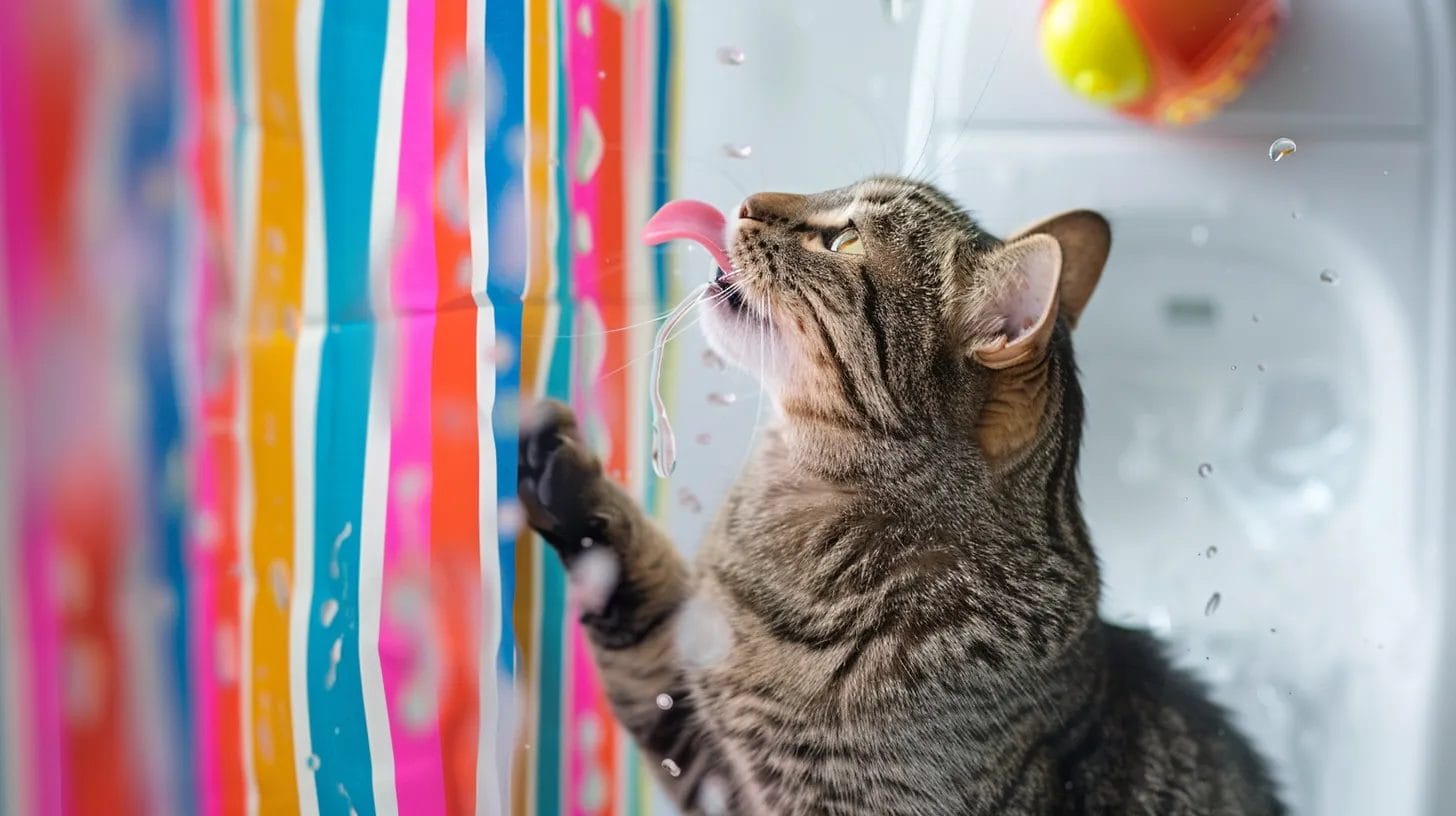Why Does My Cat Lick the Shower Curtain? Unraveling the Mystery
Let's explore the hilarious world of cat behavior and unravel the mystery behind this bizarre shower curtain-licking obsession.
Key Takeaways
- Cats are naturally curious and attracted to shower curtains' unique textures and smells.
- The dampness and water residue on shower curtains entice cats to lick them.
- Licking shower curtains can mimic grooming behavior, providing dental care or oral stimulation.
- Shower curtains offer sensory stimulation through different materials, textures, and movements.
- Excessive licking may indicate stress, anxiety, or nutritional deficiencies, warranting a veterinary consultation.
Exploring Cats' Fascination with Shower Curtains
You've probably noticed your cat's peculiar interest in the shower curtain, but have you ever wondered why?
Curiosity and Exploration of New Textures and Smells
Cats' natural curiosity often leads them to explore and lick shower curtains, drawn to the allure of new textures and smells. This behavior is more than just a quirky habit; it's a form of sensory stimulation.
The shower curtain's unique surface can retain scents from soaps, shampoos, and other products, intriguing your cat. Each lick allows them to experience a world of different textures and smells, satisfying their investigative nature.
Attraction to Damp Surfaces and Water Residues
The dampness and residues from your bath products may also attract your cat. This attraction to damp surfaces and water residues is critical to their licking behavior.
After you shower, the lingering scent of soap, shampoo, and other products can captivate your cat, leading them to explore and lick the surface.
Sensory Stimulation from Different Materials and Patterns
Why do your feline friends find the shower curtain so captivating? It's all about sensory stimulation. Cats have an innate curiosity that drives their exploration, and the shower curtain presents a unique opportunity for this. The different materials, textures, movements, and sounds grab your cat's attention.
The patterns and colors can also pique their interest, making the shower curtain a fascinating object for investigation.
Grooming and Self-Cleaning Behavior
It's not just quirky when your cat licks the shower curtain. It often mimics grooming behaviors on fabric surfaces.
Mimic Grooming Behaviors on Fabric Surfaces
Cats' licking of shower curtains often mimics their natural grooming behaviors, engaging in self-cleaning activities on the fabric's surface. This behavior isn't just a random act; it's deeply rooted in their instinct to maintain cleanliness. The shower curtain's unique texture can be particularly appealing to them. It provides a different surface for them to carry out these grooming behaviors that are essential for their well-being.
Use Shower Curtains for Tooth Cleaning or Oral Stimulation
Licking shower curtains can also serve as a form of dental care or oral stimulation for your cat. It's a way for them to remove loose fur, dirt, or debris from their tongues, promoting cleaner mouths. At first, it may seem strange, but your cat's interest in the shower curtain is a natural extension of their grooming. It provides both oral care and sensory stimulation, which they find appealing.
Stress Relief and Comfort Seeking
You might notice your cat licking the shower curtain and wonder why they're doing it. It's not just random behavior; it's a way for them to seek comfort or relieve stress.
Licking as a Soothing Behavior in Cats
Often, cats lick the shower curtain to soothe themselves and find comfort in times of stress. This soothing behavior is a deliberate action that helps them feel more secure in their environment.
When your cat licks the shower curtain, it engages in a self-soothing activity reminiscent of grooming. This not only helps it regulate its emotions but also lowers its anxiety levels. It's a clear indication that it's seeking a way to cope with stress.
If your cat frequently turns to the shower curtain for comfort, it might show a need for more environmental enrichment or mental stimulation.
Seek Familiar Scents or Owner's Smell
Cats might lick shower curtains to seek out the comforting scent of their owners, offering them stress relief and a sense of security. This behavior is a deep-rooted instinct to connect with familiar scents, especially their owner's smell, which provides a comforting presence.
Providing an item with your scent, such as a worn t-shirt, may reduce their urge to lick the shower curtain. This is harmless and allows them to feel closer to you.
Health Concerns and Behavioral Triggers
You might wonder if your cat's habit of licking the shower curtain signals a deeper issue.
Address Potential Nutritional Deficiencies
When your cat starts to lick shower curtains, it's essential to consider whether a nutritional deficiency might be driving this behavior. This unusual licking behavior could indicate that your kitten isn't receiving all the necessary nutrients from their diet.
Pica, a condition where cats compel themselves to eat non-food items, can result from nutritional deficiencies. It's a sign that your cat might be trying to compensate for the lack of essential nutrients. A balanced diet is critical in curbing this tendency to lick inappropriate objects.
Identify Underlying Medical Conditions or Dental Issues
After considering dietary factors, it's also important to explore whether health issues or dental problems are prompting your cat's interest in licking the shower curtain. Dental issues like gingivitis or more serious conditions such as stomatitis can cause discomfort, leading to this unusual licking behavior.
Similarly, medical conditions, such as oral ulcers or dental abscesses, may cause your cat to seek relief by licking odd surfaces. It's not just about discomfort; compulsive behavior stemming from these conditions could be a sign your cat is trying to manage their pain or discomfort. Thus, monitoring behavior closely is crucial.
Redirecting and Managing Licking Behavior
If your cat's licking the shower curtain, you're likely looking for ways to manage this behavior.
Provide Alternative Surfaces or Toys for Licking
To redirect your cat's shower curtain-licking habit, provide them with alternative surfaces or toys. Introducing scratching posts, both vertical and horizontal, can satisfy their natural urges and potentially reduce their fascination with the shower curtain.
Additionally, incorporating interactive toys and puzzle feeders can engage your cat's mind, offering the mental stimulation they crave. This not only keeps them occupied but also helps divert their attention away from undesirable objects. By engaging in regular interactive play sessions using wand toys or laser pointers, you're providing an outlet for their energy, minimizing the likelihood of them turning to the shower curtain as a source of entertainment or comfort.
Use Cat-Safe Deterrents or Repellents on Shower Curtains
You can effectively discourage your cat's interest in licking the shower curtain by applying cat-safe deterrents like citrus sprays or double-sided tape. These deterrents work by making the shower curtain less appealing to your cat without harming it.
Cats generally dislike citrus sprays due to their strong natural scents, which can deter them from licking areas you don't want them to. Similarly, double-sided tape provides an unpleasant texture that cats tend to avoid. By redirecting their attention, you can guide them toward more appropriate behaviors.
Preventive Measures and Training Techniques
To prevent your cat from licking shower curtains, focusing on their overall well-being and habits is essential.
Establish Consistent Grooming Routines for Cats
Establishing consistent grooming routines for your cat not only maintains its coat's health but also helps prevent hairballs. When you incorporate positive reinforcement, your cat will become more receptive to grooming sessions. Treats and gentle praise go a long way toward encouraging regular grooming behavior.
Opting for cat-friendly grooming tools, such as soft brushes and combs, can make the experience more enjoyable for both of you. These tools not only reduce shedding but also prevent matting, ensuring your cat's fur stays healthy and lustrous.
Regular grooming routines not only keep your cat looking its best but also strengthen the bond between you. Through patience and consistency, you'll create a positive grooming experience that benefits your cat's physical health and your relationship.
Create Enriching Environments to Reduce Stress and Anxiety
Enriching your cat's environment with interactive toys and cozy hideaways will reduce stress and anxiety. Cat enrichment is essential for their well-being.
Introducing interactive toys keeps them mentally stimulated and physically active, preventing boredom and stress. Incorporating vertical space, such as cat trees or shelves, allows your feline friend to climb and explore, satisfying their natural instincts.
Puzzle feeders challenge their minds and mimic the hunting experience, making mealtime engaging and rewarding. Establishing a routine playtime ensures they have a healthy outlet for their energy, reducing stress-related behaviors.
Positive Reinforcement and Reward-Based Training for Desired Behaviors
Implementing positive reinforcement and reward-based training is an effective strategy for encouraging your cat to engage in desired behaviors, such as choosing a scratching post over the shower curtain. By using treats, toys, or praise every time your cat opts for more appropriate activities, you can guide them towards habits you want to see. Remember, consistency is crucial. Rewarding these behaviors every time will make the lesson stick.
Redirecting attention is another vital technique. If you catch your cat eyeing the shower curtain, gently guide them towards a more suitable outlet, like interactive toys. These not only divert their attention but also provide essential mental stimulation, which further discourages unwanted behavior. With patience and consistent positive reinforcement, you can foster a healthier environment for both you and your cat.
Conclusion: Why Does My Cat Lick the Shower Curtain?
In conclusion, it's clear that your cat's fascination with licking the shower curtain is multifaceted, stemming from grooming habits, stress relief needs, or sheer curiosity.
While generally harmless, look for obsessive behaviors that might indicate health issues. Redirecting their attention and applying preventive strategies can help them effectively manage this quirky habit.
Understanding and addressing the root cause will ensure both you and your feline friend maintain a happy, healthy environment.
Learn more bathroom tips at CottonCat Blog! Find your next favorite shower curtain at CottonCat!
FAQs
Why does my cat keep licking the curtains?
Your cat might be licking the curtains due to their intriguing texture or smell, seeking comfort, or simply exploring. It's their way of engaging with their environment, possibly driven by curiosity or boredom.
Why does my cat keep eating the shower curtain?
Your cat might be eating the shower curtain due to the texture or smell attracting them, as a form of stress relief, or simply out of curiosity. Consider offering safe alternatives to explore or chew on.
Why do cats like licking plastic bags?
Your cat may lick plastic bags due to its attraction to the texture or scent, seeking solace in the act, or exhibiting symptoms of pica. It's crucial to watch for excessive behavior and consult a vet.


